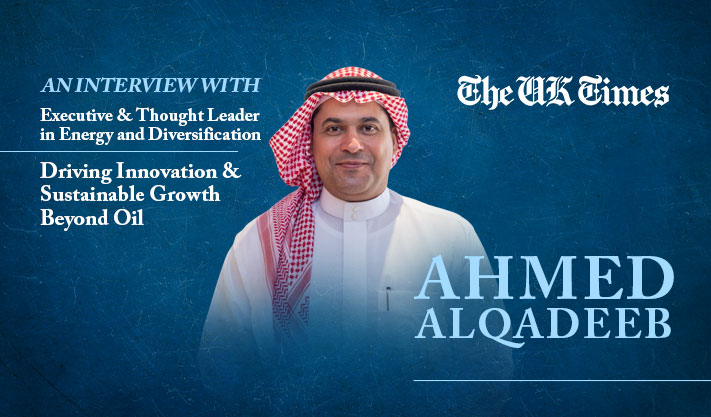Ahmed Alqadeeb Interview
Ahmed Alqadeeb is a seasoned C-suite executive and thought leader with more than two decades of leadership experience across the energy, maritime, and industrial sectors. Over the course of his career, he has spearheaded strategic growth initiatives, joint ventures, and large-scale transformation programs that delivered tangible value and enduring impact. Widely recognized for his ability to drive business turnarounds, foster partnerships, and navigate complex markets, Ahmed has built a track record of resilience and success.
Beyond his corporate achievements, Ahmed is a strong advocate for the Kingdom’s economic transformation under Vision 2030. He has consistently emphasized the importance of diversification, sustainability, and innovation as the foundations of long-term prosperity. His journey is seen by many as a story of milestones and legacy—proof that leaders can step confidently into new chapters while carrying forward the successes of the past.
Strategic Leadership amid Volatility
We started the interview by asking, “In today’s volatile and uncertain markets, what does strategic leadership truly mean to you?”
Ahmed Alqadeeb replied, “For me, strategic leadership is the art of navigating change without losing sight of long-term vision. It’s about balancing clarity of purpose with the agility to adapt to unexpected shifts. In dynamic markets, no strategy can remain static for long—leaders must constantly evaluate, refine, and redirect efforts to remain competitive.
At its core, strategic leadership is about seeing beyond the turbulence of the present and positioning the organization for future success. But it’s not only about the strategy itself; it’s also about people. Leaders must communicate effectively, inspire confidence, and empower their teams to adapt quickly. By creating an environment where challenges are approached with solutions-driven thinking, leaders can maintain momentum even in uncertain times. Ultimately, it’s about cultivating resilience, foresight, and adaptability—qualities that enable organizations, especially within the Kingdom’s ambitious Vision 2030 journey, to thrive when others are simply trying to survive.”
Inspiring Strength Through Change
The UK Times: Transformation often brings uncertainty. How can leaders inspire resilience across their organizations?
Ahmed Alqadeeb replied, “Resilience begins with trust, and trust is built through transparent communication. When people understand the reality of the situation and feel included in the conversation, they are more willing to adapt. I believe leaders must be honest about challenges while remaining optimistic about the opportunities that change brings.
It’s equally important to invest in people—by equipping them with new skills, providing mentorship, and building a culture of continuous learning. Resilience is not simply about endurance; it’s about fostering an environment where teams feel empowered to innovate and take ownership of solutions. Recognizing and celebrating small wins during times of transition is also critical, as it reinforces belief in the process and motivates people to keep moving forward.
When employees feel engaged, valued, and supported, they can withstand uncertainty with confidence and emerge stronger both individually and collectively.”
Leading with Stability amid Change
The UK Times: You’ve led in highly competitive and cyclical industries like oil and gas. What leadership principles have helped you drive sustainable growth?
Ahmed Alqadeeb replied, “In industries as competitive and cyclical as oil and gas, sustainability requires more than just operational excellence—it requires discipline, collaboration, and foresight.
Discipline is about ensuring financial and operational stability, particularly during downturns when pressures are greatest. Collaboration is key because partnerships and joint ventures often create synergies that drive growth and help mitigate risks. And foresight is about continuously scanning for trends in markets, technologies, and regulations that could reshape the industry’s future.
By applying these principles, I have found that it’s possible not only to navigate cycles but also to capture opportunities that others might overlook. Sustainable growth, in my view, comes from balancing efficiency with innovation. It requires leaders to remain grounded in the realities of today while keeping an eye on the possibilities of tomorrow. This balance ensures both immediate profitability and long-term relevance.
In the context of the Kingdom, this also means aligning business strategies with Vision 2030—ensuring that growth not only drives profitability but also contributes to national priorities such as diversification, localization, and innovation.”
Balancing Today with Tomorrow
The UK Times: Many leaders face pressure between short-term performance and long-term strategy. How do you balance both?
Ahmed Alqadeeb replied, “Balancing short-term pressures with long-term strategy is one of the toughest challenges leaders face. I believe in operating on a dual-track approach. On one hand, there must be a relentless focus on driving efficiency, profitability, and operational excellence in the short term. On the other hand, leaders must also invest in innovation, market expansion, and digital transformation to prepare for the future.
Strong governance, measurable KPIs, and accountability structures are crucial in ensuring neither track is neglected. Equally important is communication—leaders must clearly articulate the “why” behind long-term investments so that stakeholders, whether employees or shareholders, understand the value these initiatives will generate. By doing so, organizations can meet today’s demands while laying a foundation for sustainable success.”
Lessons from M&A and Turnarounds
The UK Times: Transformation often involves M&A, partnerships, or business turnarounds. What lessons have you learned from leading such high-stakes initiatives?
Ahmed Alqadeeb replied, “One of the most important lessons I’ve learned from managing M&A and turnarounds is that numbers alone don’t guarantee success—culture does. While financials, assets, and contracts are critical, the long-term success of any integration depends on how well people, processes, and values align.
I’ve seen deals that looked excellent on paper struggle because leadership underestimated cultural differences. That’s why I believe in looking beyond due diligence reports and focusing equally on the human side of integration. Clear governance structures and decisive action, especially within the first 100 days, also play a defining role. Stakeholders need clarity, direction, and reassurance during transitions.
At the same time, agility is essential—leaders must be prepared to adjust strategies quickly as realities unfold. In essence, high-stakes transformations succeed when they are managed with both analytical rigor and human sensitivity.”
Leading Through Tech-Driven Change
The UK Times: Technology and digital disruption are reshaping industries. How should leaders navigate this shift while keeping human capital engaged?
Ahmed Alqadeeb replied, “Digital transformation is often misunderstood as replacing people with technology, but I see it as empowering people to achieve more. The key is helping employees understand how technology enhances their capabilities rather than threatening their roles.
Leaders must invest in digital literacy and continuous learning so that their teams grow in tandem with technological changes. Equally, it’s important to involve employees in the transformation process—listening to their concerns, inviting their ideas, and giving them ownership of new solutions. This inclusion reduces resistance and builds excitement.
One example of cutting-edge digital solutions is Fueltrax. Their Electronic Fuel Management System (EFMS) leverages accurate mass-flow sensors to continuously monitor fuel consumption, prevent theft, and detect anomalies immediately. Data is uploaded securely every 15 minutes to the FuelNet portal, enabling real-time visibility across teams and leadership. Moreover, Fueltrax aligns operations from crew to C-suite, breaking silos and ensuring everyone works from the same trusted data.
When people feel supported, engaged, and equipped, they become active champions of technology-driven change rather than passive observers—or worse, skeptics.”
Wisdom for Leading Through Change
The UK Times: What advice would you give to emerging leaders who aspire to guide organizations through transformation and uncertainty?
Ahmed Alqadeeb replied, “My advice to future leaders is to embrace complexity rather than fear it. Uncertainty is a constant in today’s markets, and those who thrive are the ones who learn to adapt quickly. Build resilience by seeing challenges as opportunities for growth, not setbacks. Surround yourself with mentors and collaborators—leadership is not a solo journey.
Most importantly, never lose sight of purpose. People look to leaders for direction, and when you lead with integrity and clarity of vision, trust naturally follows. Trust is the most valuable currency in times of uncertainty; it allows leaders to mobilize people and resources effectively.
Also, invest in continuous learning. Markets, technologies, and business models evolve rapidly, and staying relevant requires humility and curiosity. Above all, remember that leadership is about people—strategies may change, but the ability to inspire and empower others remains timeless.”
Final Reflection
In my perspective, one of the most critical elements of lasting success is ensuring full alignment between leadership and shareholders. When both sides are united around a shared vision, and when the purpose is communicated transparently, it creates clarity and trust across the entire organization.
Also, effective leadership cannot be a one-man show—decision-making must be collaborative, inclusive, and supported by sound governance.
Challenges will always arise, but they must be faced with planning, openness, and accountability. Transparency not only builds confidence, it also transforms challenges into opportunities for growth. This harmony between ownership and leadership, coupled with collective decision-making, is the foundation upon which sustainable achievements are built.
Connect with Ahmed Alqadeeb on LinkedIn
Also Read:
Mohammad Abbas Mirza Interview, Future of Intelligent Systems
Interview with Cllr Fatima Zaman on Mental Health
Dr. Sofica Bistriceanu’s Journey























